Report on Managing a Successful Business Project (Unit 6) - Semester 1
VerifiedAdded on 2022/12/29
|23
|4564
|64
Report
AI Summary
This report delves into the complexities of managing a successful business project, focusing on talent management within an organization, specifically using Tesco as a case study. The report begins by outlining aims and objectives related to talent management and its impact on workforce performance. It then presents a project management plan, including initiation, planning, execution, and controlling phases, along with a work breakdown structure and Gantt chart to visualize project timelines. A literature review explores the significance of talent management, its influence on employee motivation and working standards, and strategies for its implementation. The research methodology, employing a qualitative approach, is detailed. Data analysis examines talent management practices, performance reviews, and their effects on employee engagement and productivity. The report concludes with key findings and recommendations for enhancing talent management strategies, supported by references and an appendix.
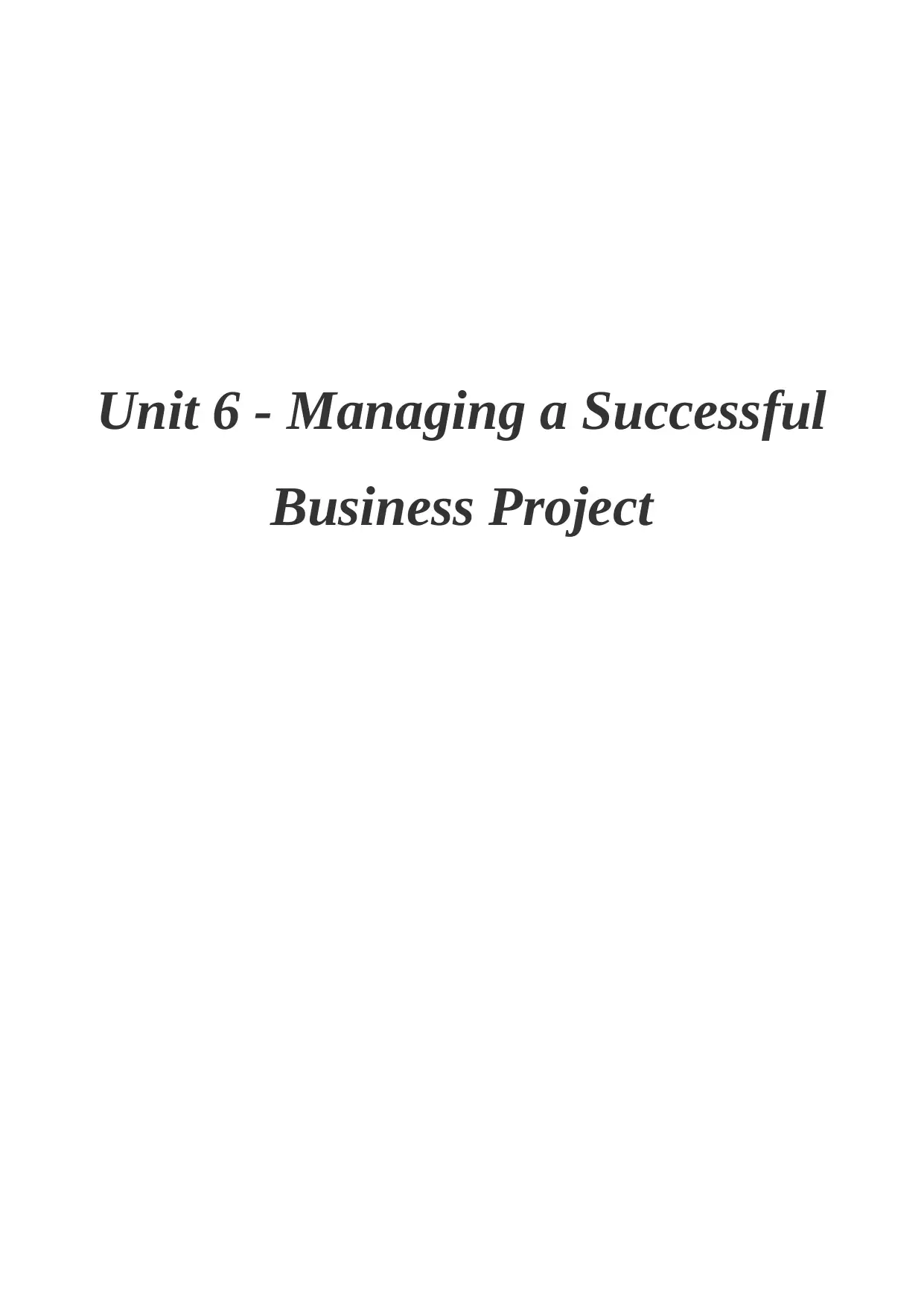
Unit 6 - Managing a Successful
Business Project
Business Project
Paraphrase This Document
Need a fresh take? Get an instant paraphrase of this document with our AI Paraphraser
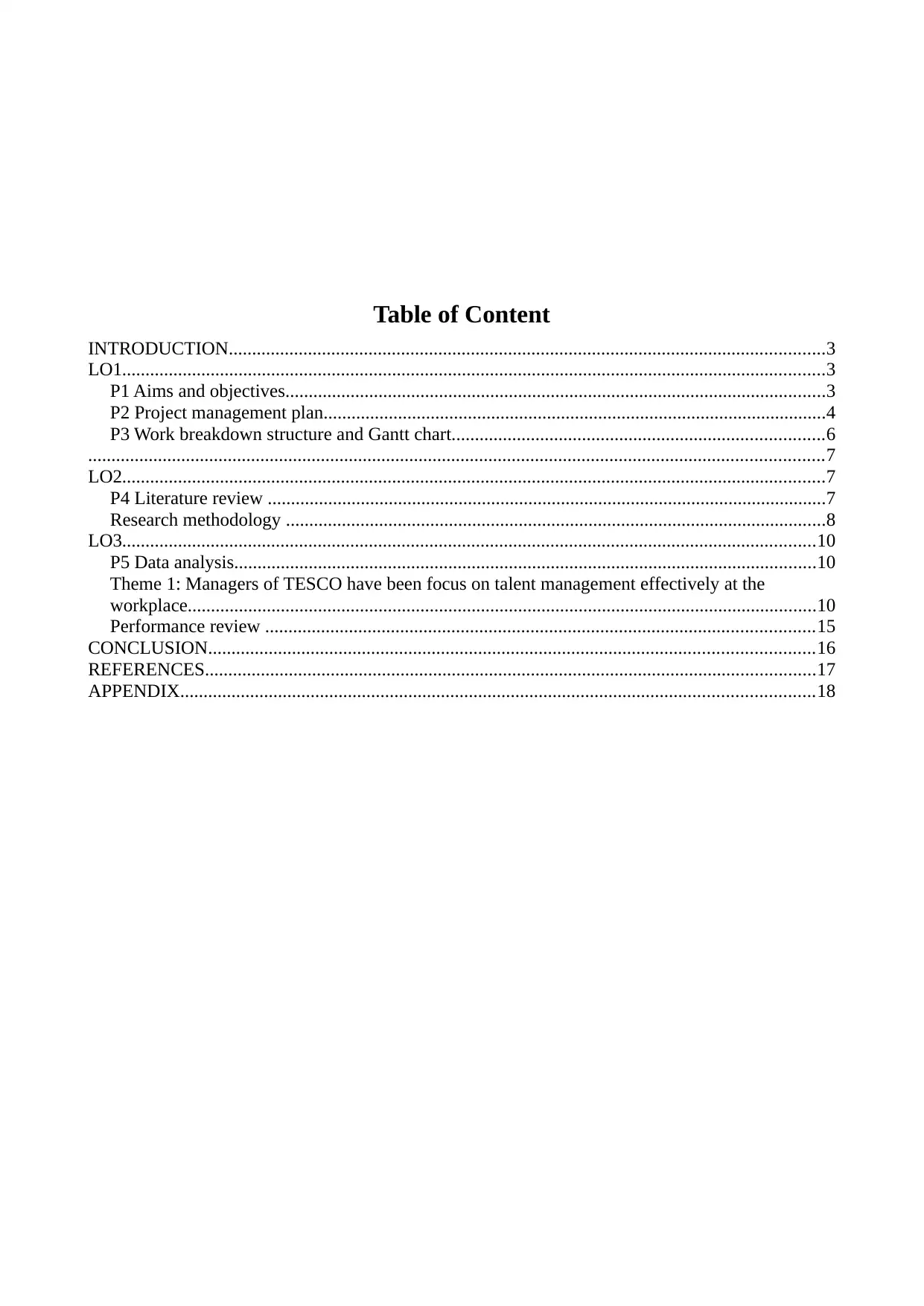
Table of Content
INTRODUCTION................................................................................................................................3
LO1.......................................................................................................................................................3
P1 Aims and objectives....................................................................................................................3
P2 Project management plan............................................................................................................4
P3 Work breakdown structure and Gantt chart................................................................................6
..............................................................................................................................................................7
LO2.......................................................................................................................................................7
P4 Literature review ........................................................................................................................7
Research methodology ....................................................................................................................8
LO3.....................................................................................................................................................10
P5 Data analysis.............................................................................................................................10
Theme 1: Managers of TESCO have been focus on talent management effectively at the
workplace.......................................................................................................................................10
Performance review ......................................................................................................................15
CONCLUSION..................................................................................................................................16
REFERENCES...................................................................................................................................17
APPENDIX........................................................................................................................................18
INTRODUCTION................................................................................................................................3
LO1.......................................................................................................................................................3
P1 Aims and objectives....................................................................................................................3
P2 Project management plan............................................................................................................4
P3 Work breakdown structure and Gantt chart................................................................................6
..............................................................................................................................................................7
LO2.......................................................................................................................................................7
P4 Literature review ........................................................................................................................7
Research methodology ....................................................................................................................8
LO3.....................................................................................................................................................10
P5 Data analysis.............................................................................................................................10
Theme 1: Managers of TESCO have been focus on talent management effectively at the
workplace.......................................................................................................................................10
Performance review ......................................................................................................................15
CONCLUSION..................................................................................................................................16
REFERENCES...................................................................................................................................17
APPENDIX........................................................................................................................................18
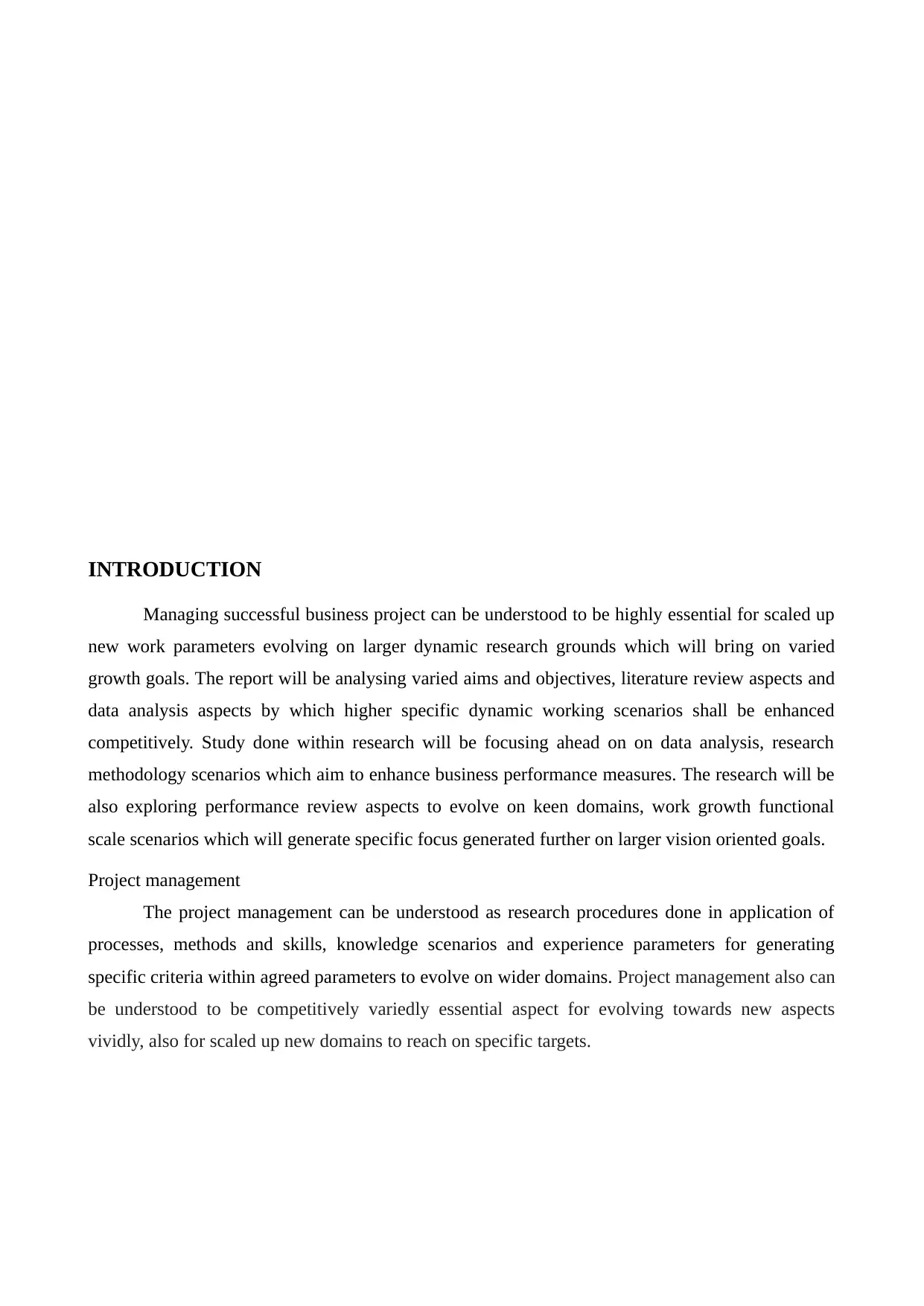
INTRODUCTION
Managing successful business project can be understood to be highly essential for scaled up
new work parameters evolving on larger dynamic research grounds which will bring on varied
growth goals. The report will be analysing varied aims and objectives, literature review aspects and
data analysis aspects by which higher specific dynamic working scenarios shall be enhanced
competitively. Study done within research will be focusing ahead on on data analysis, research
methodology scenarios which aim to enhance business performance measures. The research will be
also exploring performance review aspects to evolve on keen domains, work growth functional
scale scenarios which will generate specific focus generated further on larger vision oriented goals.
Project management
The project management can be understood as research procedures done in application of
processes, methods and skills, knowledge scenarios and experience parameters for generating
specific criteria within agreed parameters to evolve on wider domains. Project management also can
be understood to be competitively variedly essential aspect for evolving towards new aspects
vividly, also for scaled up new domains to reach on specific targets.
Managing successful business project can be understood to be highly essential for scaled up
new work parameters evolving on larger dynamic research grounds which will bring on varied
growth goals. The report will be analysing varied aims and objectives, literature review aspects and
data analysis aspects by which higher specific dynamic working scenarios shall be enhanced
competitively. Study done within research will be focusing ahead on on data analysis, research
methodology scenarios which aim to enhance business performance measures. The research will be
also exploring performance review aspects to evolve on keen domains, work growth functional
scale scenarios which will generate specific focus generated further on larger vision oriented goals.
Project management
The project management can be understood as research procedures done in application of
processes, methods and skills, knowledge scenarios and experience parameters for generating
specific criteria within agreed parameters to evolve on wider domains. Project management also can
be understood to be competitively variedly essential aspect for evolving towards new aspects
vividly, also for scaled up new domains to reach on specific targets.
⊘ This is a preview!⊘
Do you want full access?
Subscribe today to unlock all pages.

Trusted by 1+ million students worldwide
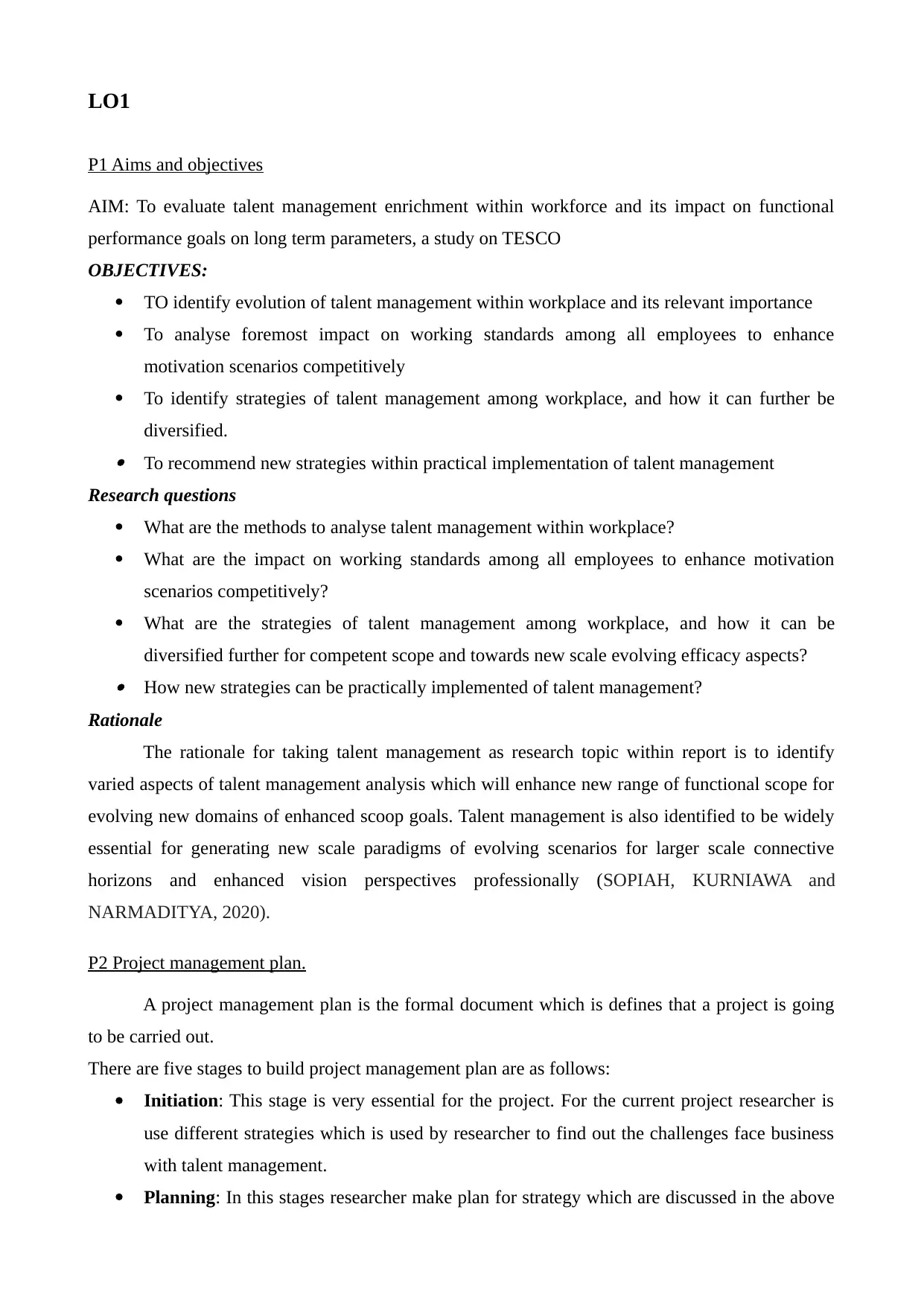
LO1
P1 Aims and objectives
AIM: To evaluate talent management enrichment within workforce and its impact on functional
performance goals on long term parameters, a study on TESCO
OBJECTIVES:
TO identify evolution of talent management within workplace and its relevant importance
To analyse foremost impact on working standards among all employees to enhance
motivation scenarios competitively
To identify strategies of talent management among workplace, and how it can further be
diversified. To recommend new strategies within practical implementation of talent management
Research questions
What are the methods to analyse talent management within workplace?
What are the impact on working standards among all employees to enhance motivation
scenarios competitively?
What are the strategies of talent management among workplace, and how it can be
diversified further for competent scope and towards new scale evolving efficacy aspects? How new strategies can be practically implemented of talent management?
Rationale
The rationale for taking talent management as research topic within report is to identify
varied aspects of talent management analysis which will enhance new range of functional scope for
evolving new domains of enhanced scoop goals. Talent management is also identified to be widely
essential for generating new scale paradigms of evolving scenarios for larger scale connective
horizons and enhanced vision perspectives professionally (SOPIAH, KURNIAWA and
NARMADITYA, 2020).
P2 Project management plan.
A project management plan is the formal document which is defines that a project is going
to be carried out.
There are five stages to build project management plan are as follows:
Initiation: This stage is very essential for the project. For the current project researcher is
use different strategies which is used by researcher to find out the challenges face business
with talent management.
Planning: In this stages researcher make plan for strategy which are discussed in the above
P1 Aims and objectives
AIM: To evaluate talent management enrichment within workforce and its impact on functional
performance goals on long term parameters, a study on TESCO
OBJECTIVES:
TO identify evolution of talent management within workplace and its relevant importance
To analyse foremost impact on working standards among all employees to enhance
motivation scenarios competitively
To identify strategies of talent management among workplace, and how it can further be
diversified. To recommend new strategies within practical implementation of talent management
Research questions
What are the methods to analyse talent management within workplace?
What are the impact on working standards among all employees to enhance motivation
scenarios competitively?
What are the strategies of talent management among workplace, and how it can be
diversified further for competent scope and towards new scale evolving efficacy aspects? How new strategies can be practically implemented of talent management?
Rationale
The rationale for taking talent management as research topic within report is to identify
varied aspects of talent management analysis which will enhance new range of functional scope for
evolving new domains of enhanced scoop goals. Talent management is also identified to be widely
essential for generating new scale paradigms of evolving scenarios for larger scale connective
horizons and enhanced vision perspectives professionally (SOPIAH, KURNIAWA and
NARMADITYA, 2020).
P2 Project management plan.
A project management plan is the formal document which is defines that a project is going
to be carried out.
There are five stages to build project management plan are as follows:
Initiation: This stage is very essential for the project. For the current project researcher is
use different strategies which is used by researcher to find out the challenges face business
with talent management.
Planning: In this stages researcher make plan for strategy which are discussed in the above
Paraphrase This Document
Need a fresh take? Get an instant paraphrase of this document with our AI Paraphraser
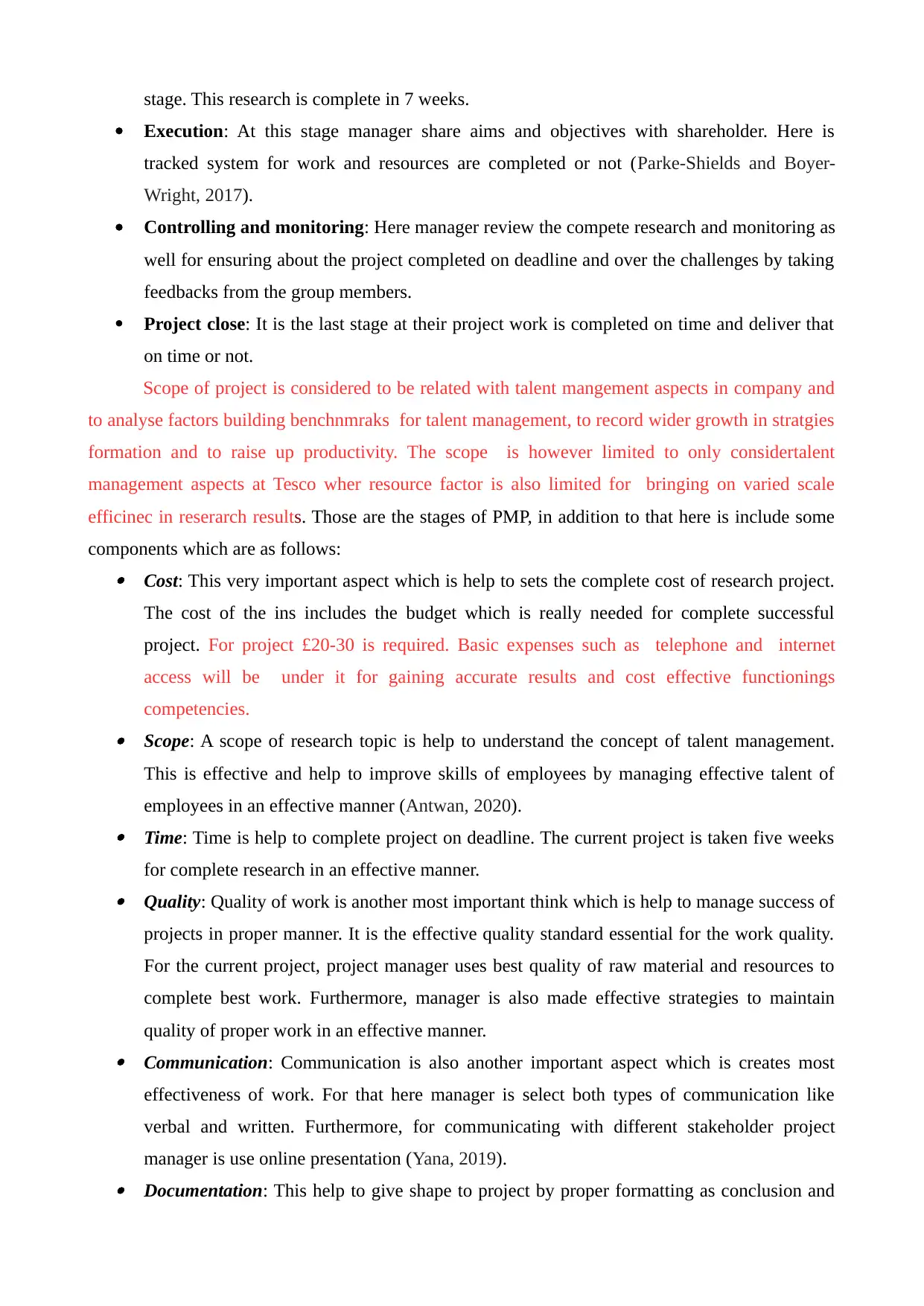
stage. This research is complete in 7 weeks.
Execution: At this stage manager share aims and objectives with shareholder. Here is
tracked system for work and resources are completed or not (Parke-Shields and Boyer-
Wright, 2017).
Controlling and monitoring: Here manager review the compete research and monitoring as
well for ensuring about the project completed on deadline and over the challenges by taking
feedbacks from the group members.
Project close: It is the last stage at their project work is completed on time and deliver that
on time or not.
Scope of project is considered to be related with talent mangement aspects in company and
to analyse factors building benchnmraks for talent management, to record wider growth in stratgies
formation and to raise up productivity. The scope is however limited to only considertalent
management aspects at Tesco wher resource factor is also limited for bringing on varied scale
efficinec in reserarch results. Those are the stages of PMP, in addition to that here is include some
components which are as follows: Cost: This very important aspect which is help to sets the complete cost of research project.
The cost of the ins includes the budget which is really needed for complete successful
project. For project £20-30 is required. Basic expenses such as telephone and internet
access will be under it for gaining accurate results and cost effective functionings
competencies. Scope: A scope of research topic is help to understand the concept of talent management.
This is effective and help to improve skills of employees by managing effective talent of
employees in an effective manner (Antwan, 2020). Time: Time is help to complete project on deadline. The current project is taken five weeks
for complete research in an effective manner. Quality: Quality of work is another most important think which is help to manage success of
projects in proper manner. It is the effective quality standard essential for the work quality.
For the current project, project manager uses best quality of raw material and resources to
complete best work. Furthermore, manager is also made effective strategies to maintain
quality of proper work in an effective manner. Communication: Communication is also another important aspect which is creates most
effectiveness of work. For that here manager is select both types of communication like
verbal and written. Furthermore, for communicating with different stakeholder project
manager is use online presentation (Yana, 2019). Documentation: This help to give shape to project by proper formatting as conclusion and
Execution: At this stage manager share aims and objectives with shareholder. Here is
tracked system for work and resources are completed or not (Parke-Shields and Boyer-
Wright, 2017).
Controlling and monitoring: Here manager review the compete research and monitoring as
well for ensuring about the project completed on deadline and over the challenges by taking
feedbacks from the group members.
Project close: It is the last stage at their project work is completed on time and deliver that
on time or not.
Scope of project is considered to be related with talent mangement aspects in company and
to analyse factors building benchnmraks for talent management, to record wider growth in stratgies
formation and to raise up productivity. The scope is however limited to only considertalent
management aspects at Tesco wher resource factor is also limited for bringing on varied scale
efficinec in reserarch results. Those are the stages of PMP, in addition to that here is include some
components which are as follows: Cost: This very important aspect which is help to sets the complete cost of research project.
The cost of the ins includes the budget which is really needed for complete successful
project. For project £20-30 is required. Basic expenses such as telephone and internet
access will be under it for gaining accurate results and cost effective functionings
competencies. Scope: A scope of research topic is help to understand the concept of talent management.
This is effective and help to improve skills of employees by managing effective talent of
employees in an effective manner (Antwan, 2020). Time: Time is help to complete project on deadline. The current project is taken five weeks
for complete research in an effective manner. Quality: Quality of work is another most important think which is help to manage success of
projects in proper manner. It is the effective quality standard essential for the work quality.
For the current project, project manager uses best quality of raw material and resources to
complete best work. Furthermore, manager is also made effective strategies to maintain
quality of proper work in an effective manner. Communication: Communication is also another important aspect which is creates most
effectiveness of work. For that here manager is select both types of communication like
verbal and written. Furthermore, for communicating with different stakeholder project
manager is use online presentation (Yana, 2019). Documentation: This help to give shape to project by proper formatting as conclusion and
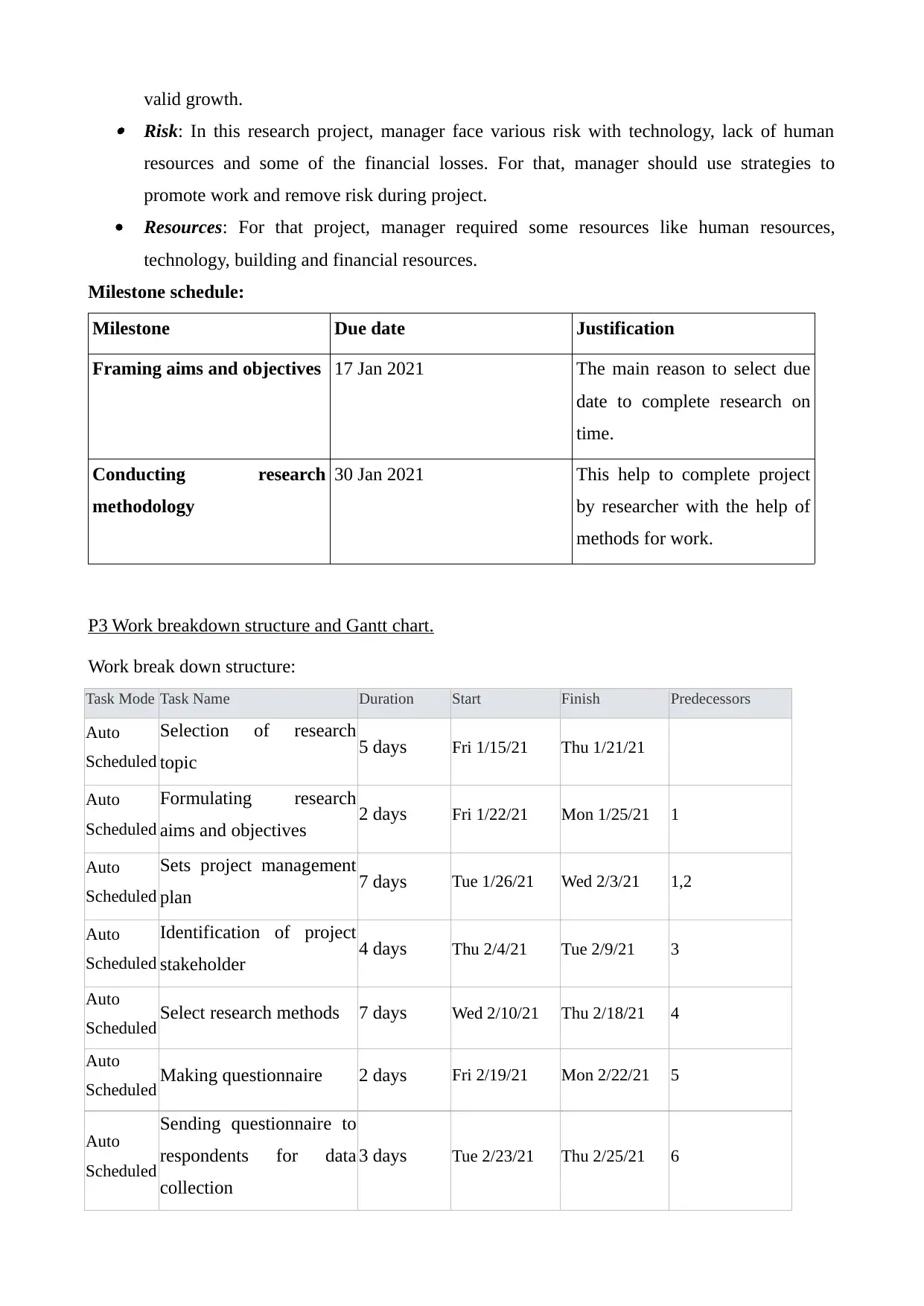
valid growth. Risk: In this research project, manager face various risk with technology, lack of human
resources and some of the financial losses. For that, manager should use strategies to
promote work and remove risk during project.
Resources: For that project, manager required some resources like human resources,
technology, building and financial resources.
Milestone schedule:
Milestone Due date Justification
Framing aims and objectives 17 Jan 2021 The main reason to select due
date to complete research on
time.
Conducting research
methodology
30 Jan 2021 This help to complete project
by researcher with the help of
methods for work.
P3 Work breakdown structure and Gantt chart.
Work break down structure:
Task Mode Task Name Duration Start Finish Predecessors
Auto
Scheduled
Selection of research
topic 5 days Fri 1/15/21 Thu 1/21/21
Auto
Scheduled
Formulating research
aims and objectives 2 days Fri 1/22/21 Mon 1/25/21 1
Auto
Scheduled
Sets project management
plan 7 days Tue 1/26/21 Wed 2/3/21 1,2
Auto
Scheduled
Identification of project
stakeholder 4 days Thu 2/4/21 Tue 2/9/21 3
Auto
Scheduled Select research methods 7 days Wed 2/10/21 Thu 2/18/21 4
Auto
Scheduled Making questionnaire 2 days Fri 2/19/21 Mon 2/22/21 5
Auto
Scheduled
Sending questionnaire to
respondents for data
collection
3 days Tue 2/23/21 Thu 2/25/21 6
resources and some of the financial losses. For that, manager should use strategies to
promote work and remove risk during project.
Resources: For that project, manager required some resources like human resources,
technology, building and financial resources.
Milestone schedule:
Milestone Due date Justification
Framing aims and objectives 17 Jan 2021 The main reason to select due
date to complete research on
time.
Conducting research
methodology
30 Jan 2021 This help to complete project
by researcher with the help of
methods for work.
P3 Work breakdown structure and Gantt chart.
Work break down structure:
Task Mode Task Name Duration Start Finish Predecessors
Auto
Scheduled
Selection of research
topic 5 days Fri 1/15/21 Thu 1/21/21
Auto
Scheduled
Formulating research
aims and objectives 2 days Fri 1/22/21 Mon 1/25/21 1
Auto
Scheduled
Sets project management
plan 7 days Tue 1/26/21 Wed 2/3/21 1,2
Auto
Scheduled
Identification of project
stakeholder 4 days Thu 2/4/21 Tue 2/9/21 3
Auto
Scheduled Select research methods 7 days Wed 2/10/21 Thu 2/18/21 4
Auto
Scheduled Making questionnaire 2 days Fri 2/19/21 Mon 2/22/21 5
Auto
Scheduled
Sending questionnaire to
respondents for data
collection
3 days Tue 2/23/21 Thu 2/25/21 6
⊘ This is a preview!⊘
Do you want full access?
Subscribe today to unlock all pages.

Trusted by 1+ million students worldwide
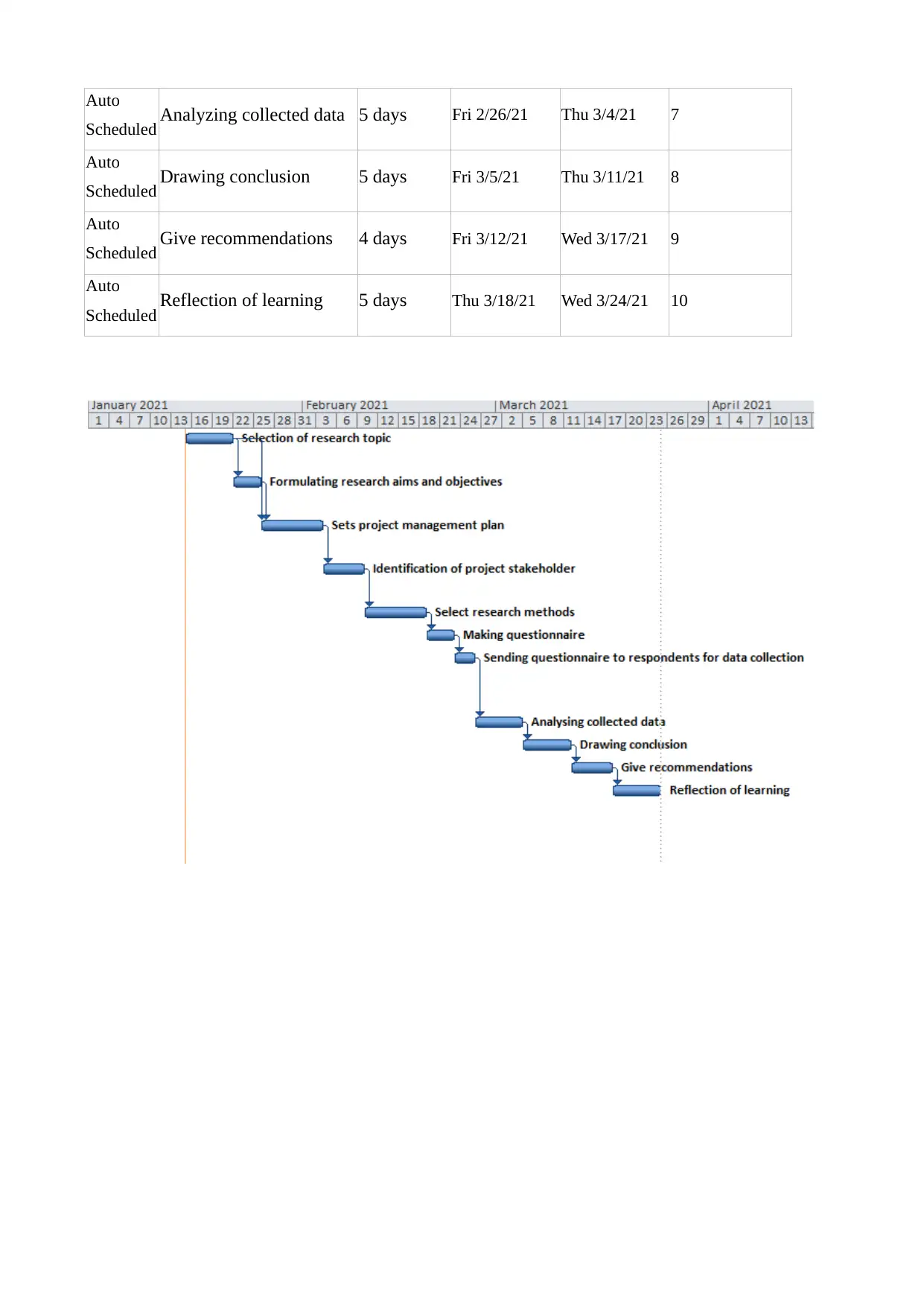
Auto
Scheduled Analyzing collected data 5 days Fri 2/26/21 Thu 3/4/21 7
Auto
Scheduled Drawing conclusion 5 days Fri 3/5/21 Thu 3/11/21 8
Auto
Scheduled Give recommendations 4 days Fri 3/12/21 Wed 3/17/21 9
Auto
Scheduled Reflection of learning 5 days Thu 3/18/21 Wed 3/24/21 10
Scheduled Analyzing collected data 5 days Fri 2/26/21 Thu 3/4/21 7
Auto
Scheduled Drawing conclusion 5 days Fri 3/5/21 Thu 3/11/21 8
Auto
Scheduled Give recommendations 4 days Fri 3/12/21 Wed 3/17/21 9
Auto
Scheduled Reflection of learning 5 days Thu 3/18/21 Wed 3/24/21 10
Paraphrase This Document
Need a fresh take? Get an instant paraphrase of this document with our AI Paraphraser
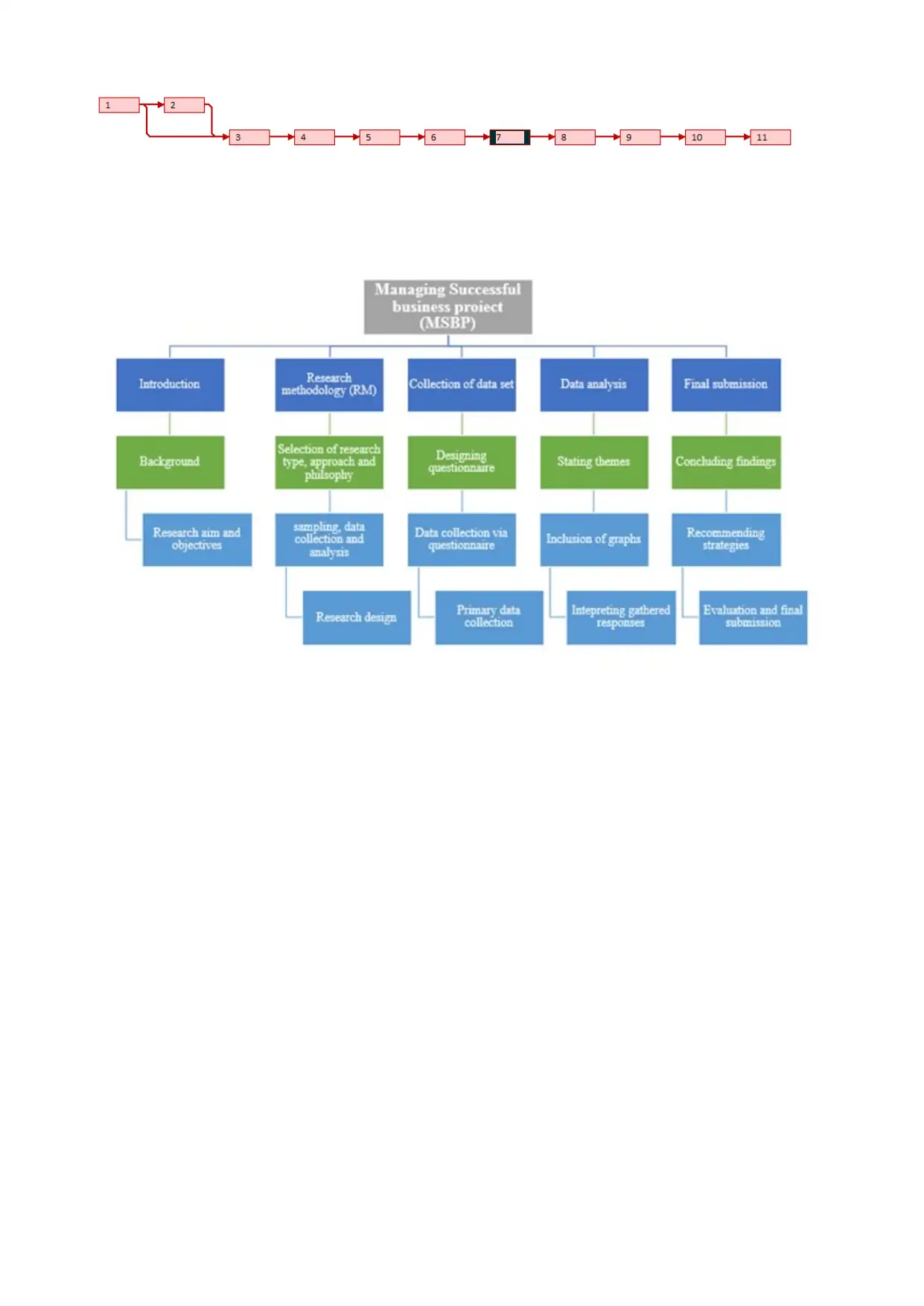
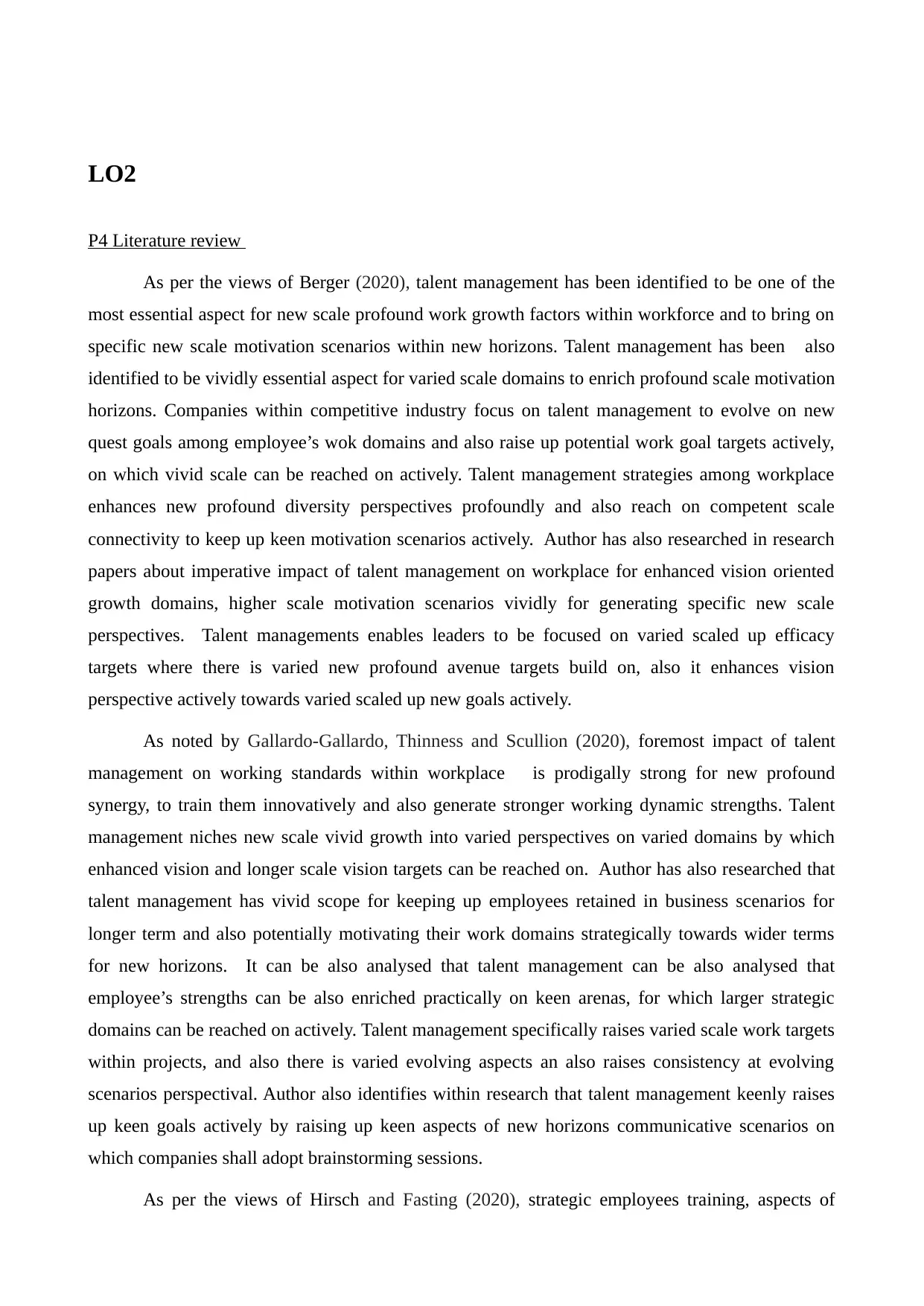
LO2
P4 Literature review
As per the views of Berger (2020), talent management has been identified to be one of the
most essential aspect for new scale profound work growth factors within workforce and to bring on
specific new scale motivation scenarios within new horizons. Talent management has been also
identified to be vividly essential aspect for varied scale domains to enrich profound scale motivation
horizons. Companies within competitive industry focus on talent management to evolve on new
quest goals among employee’s wok domains and also raise up potential work goal targets actively,
on which vivid scale can be reached on actively. Talent management strategies among workplace
enhances new profound diversity perspectives profoundly and also reach on competent scale
connectivity to keep up keen motivation scenarios actively. Author has also researched in research
papers about imperative impact of talent management on workplace for enhanced vision oriented
growth domains, higher scale motivation scenarios vividly for generating specific new scale
perspectives. Talent managements enables leaders to be focused on varied scaled up efficacy
targets where there is varied new profound avenue targets build on, also it enhances vision
perspective actively towards varied scaled up new goals actively.
As noted by Gallardo-Gallardo, Thinness and Scullion (2020), foremost impact of talent
management on working standards within workplace is prodigally strong for new profound
synergy, to train them innovatively and also generate stronger working dynamic strengths. Talent
management niches new scale vivid growth into varied perspectives on varied domains by which
enhanced vision and longer scale vision targets can be reached on. Author has also researched that
talent management has vivid scope for keeping up employees retained in business scenarios for
longer term and also potentially motivating their work domains strategically towards wider terms
for new horizons. It can be also analysed that talent management can be also analysed that
employee’s strengths can be also enriched practically on keen arenas, for which larger strategic
domains can be reached on actively. Talent management specifically raises varied scale work targets
within projects, and also there is varied evolving aspects an also raises consistency at evolving
scenarios perspectival. Author also identifies within research that talent management keenly raises
up keen goals actively by raising up keen aspects of new horizons communicative scenarios on
which companies shall adopt brainstorming sessions.
As per the views of Hirsch and Fasting (2020), strategic employees training, aspects of
P4 Literature review
As per the views of Berger (2020), talent management has been identified to be one of the
most essential aspect for new scale profound work growth factors within workforce and to bring on
specific new scale motivation scenarios within new horizons. Talent management has been also
identified to be vividly essential aspect for varied scale domains to enrich profound scale motivation
horizons. Companies within competitive industry focus on talent management to evolve on new
quest goals among employee’s wok domains and also raise up potential work goal targets actively,
on which vivid scale can be reached on actively. Talent management strategies among workplace
enhances new profound diversity perspectives profoundly and also reach on competent scale
connectivity to keep up keen motivation scenarios actively. Author has also researched in research
papers about imperative impact of talent management on workplace for enhanced vision oriented
growth domains, higher scale motivation scenarios vividly for generating specific new scale
perspectives. Talent managements enables leaders to be focused on varied scaled up efficacy
targets where there is varied new profound avenue targets build on, also it enhances vision
perspective actively towards varied scaled up new goals actively.
As noted by Gallardo-Gallardo, Thinness and Scullion (2020), foremost impact of talent
management on working standards within workplace is prodigally strong for new profound
synergy, to train them innovatively and also generate stronger working dynamic strengths. Talent
management niches new scale vivid growth into varied perspectives on varied domains by which
enhanced vision and longer scale vision targets can be reached on. Author has also researched that
talent management has vivid scope for keeping up employees retained in business scenarios for
longer term and also potentially motivating their work domains strategically towards wider terms
for new horizons. It can be also analysed that talent management can be also analysed that
employee’s strengths can be also enriched practically on keen arenas, for which larger strategic
domains can be reached on actively. Talent management specifically raises varied scale work targets
within projects, and also there is varied evolving aspects an also raises consistency at evolving
scenarios perspectival. Author also identifies within research that talent management keenly raises
up keen goals actively by raising up keen aspects of new horizons communicative scenarios on
which companies shall adopt brainstorming sessions.
As per the views of Hirsch and Fasting (2020), strategic employees training, aspects of
⊘ This is a preview!⊘
Do you want full access?
Subscribe today to unlock all pages.

Trusted by 1+ million students worldwide
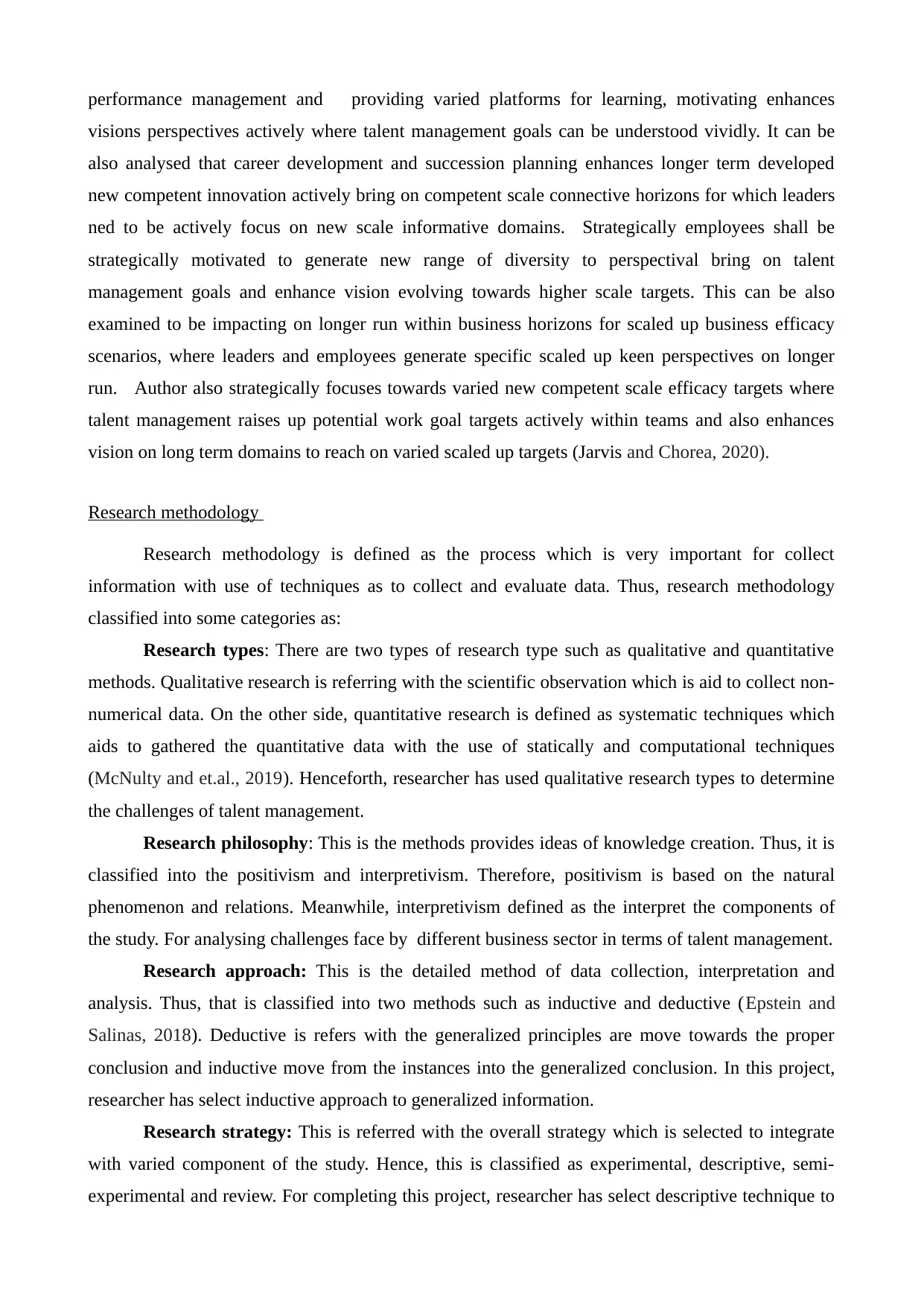
performance management and providing varied platforms for learning, motivating enhances
visions perspectives actively where talent management goals can be understood vividly. It can be
also analysed that career development and succession planning enhances longer term developed
new competent innovation actively bring on competent scale connective horizons for which leaders
ned to be actively focus on new scale informative domains. Strategically employees shall be
strategically motivated to generate new range of diversity to perspectival bring on talent
management goals and enhance vision evolving towards higher scale targets. This can be also
examined to be impacting on longer run within business horizons for scaled up business efficacy
scenarios, where leaders and employees generate specific scaled up keen perspectives on longer
run. Author also strategically focuses towards varied new competent scale efficacy targets where
talent management raises up potential work goal targets actively within teams and also enhances
vision on long term domains to reach on varied scaled up targets (Jarvis and Chorea, 2020).
Research methodology
Research methodology is defined as the process which is very important for collect
information with use of techniques as to collect and evaluate data. Thus, research methodology
classified into some categories as:
Research types: There are two types of research type such as qualitative and quantitative
methods. Qualitative research is referring with the scientific observation which is aid to collect non-
numerical data. On the other side, quantitative research is defined as systematic techniques which
aids to gathered the quantitative data with the use of statically and computational techniques
(McNulty and et.al., 2019). Henceforth, researcher has used qualitative research types to determine
the challenges of talent management.
Research philosophy: This is the methods provides ideas of knowledge creation. Thus, it is
classified into the positivism and interpretivism. Therefore, positivism is based on the natural
phenomenon and relations. Meanwhile, interpretivism defined as the interpret the components of
the study. For analysing challenges face by different business sector in terms of talent management.
Research approach: This is the detailed method of data collection, interpretation and
analysis. Thus, that is classified into two methods such as inductive and deductive (Epstein and
Salinas, 2018). Deductive is refers with the generalized principles are move towards the proper
conclusion and inductive move from the instances into the generalized conclusion. In this project,
researcher has select inductive approach to generalized information.
Research strategy: This is referred with the overall strategy which is selected to integrate
with varied component of the study. Hence, this is classified as experimental, descriptive, semi-
experimental and review. For completing this project, researcher has select descriptive technique to
visions perspectives actively where talent management goals can be understood vividly. It can be
also analysed that career development and succession planning enhances longer term developed
new competent innovation actively bring on competent scale connective horizons for which leaders
ned to be actively focus on new scale informative domains. Strategically employees shall be
strategically motivated to generate new range of diversity to perspectival bring on talent
management goals and enhance vision evolving towards higher scale targets. This can be also
examined to be impacting on longer run within business horizons for scaled up business efficacy
scenarios, where leaders and employees generate specific scaled up keen perspectives on longer
run. Author also strategically focuses towards varied new competent scale efficacy targets where
talent management raises up potential work goal targets actively within teams and also enhances
vision on long term domains to reach on varied scaled up targets (Jarvis and Chorea, 2020).
Research methodology
Research methodology is defined as the process which is very important for collect
information with use of techniques as to collect and evaluate data. Thus, research methodology
classified into some categories as:
Research types: There are two types of research type such as qualitative and quantitative
methods. Qualitative research is referring with the scientific observation which is aid to collect non-
numerical data. On the other side, quantitative research is defined as systematic techniques which
aids to gathered the quantitative data with the use of statically and computational techniques
(McNulty and et.al., 2019). Henceforth, researcher has used qualitative research types to determine
the challenges of talent management.
Research philosophy: This is the methods provides ideas of knowledge creation. Thus, it is
classified into the positivism and interpretivism. Therefore, positivism is based on the natural
phenomenon and relations. Meanwhile, interpretivism defined as the interpret the components of
the study. For analysing challenges face by different business sector in terms of talent management.
Research approach: This is the detailed method of data collection, interpretation and
analysis. Thus, that is classified into two methods such as inductive and deductive (Epstein and
Salinas, 2018). Deductive is refers with the generalized principles are move towards the proper
conclusion and inductive move from the instances into the generalized conclusion. In this project,
researcher has select inductive approach to generalized information.
Research strategy: This is referred with the overall strategy which is selected to integrate
with varied component of the study. Hence, this is classified as experimental, descriptive, semi-
experimental and review. For completing this project, researcher has select descriptive technique to
Paraphrase This Document
Need a fresh take? Get an instant paraphrase of this document with our AI Paraphraser
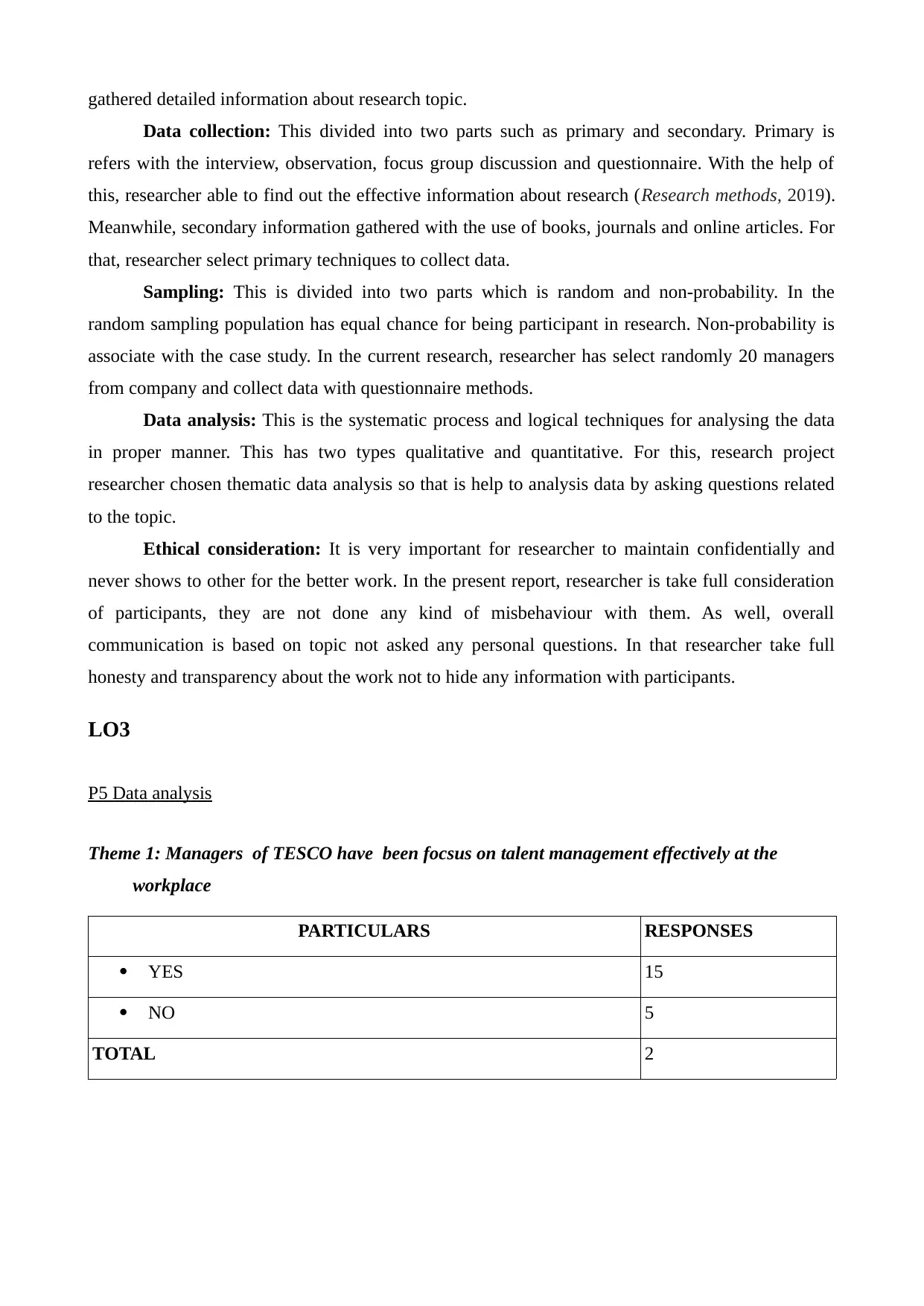
gathered detailed information about research topic.
Data collection: This divided into two parts such as primary and secondary. Primary is
refers with the interview, observation, focus group discussion and questionnaire. With the help of
this, researcher able to find out the effective information about research (Research methods, 2019).
Meanwhile, secondary information gathered with the use of books, journals and online articles. For
that, researcher select primary techniques to collect data.
Sampling: This is divided into two parts which is random and non-probability. In the
random sampling population has equal chance for being participant in research. Non-probability is
associate with the case study. In the current research, researcher has select randomly 20 managers
from company and collect data with questionnaire methods.
Data analysis: This is the systematic process and logical techniques for analysing the data
in proper manner. This has two types qualitative and quantitative. For this, research project
researcher chosen thematic data analysis so that is help to analysis data by asking questions related
to the topic.
Ethical consideration: It is very important for researcher to maintain confidentially and
never shows to other for the better work. In the present report, researcher is take full consideration
of participants, they are not done any kind of misbehaviour with them. As well, overall
communication is based on topic not asked any personal questions. In that researcher take full
honesty and transparency about the work not to hide any information with participants.
LO3
P5 Data analysis
Theme 1: Managers of TESCO have been focsus on talent management effectively at the
workplace
PARTICULARS RESPONSES
YES 15
NO 5
TOTAL 2
Data collection: This divided into two parts such as primary and secondary. Primary is
refers with the interview, observation, focus group discussion and questionnaire. With the help of
this, researcher able to find out the effective information about research (Research methods, 2019).
Meanwhile, secondary information gathered with the use of books, journals and online articles. For
that, researcher select primary techniques to collect data.
Sampling: This is divided into two parts which is random and non-probability. In the
random sampling population has equal chance for being participant in research. Non-probability is
associate with the case study. In the current research, researcher has select randomly 20 managers
from company and collect data with questionnaire methods.
Data analysis: This is the systematic process and logical techniques for analysing the data
in proper manner. This has two types qualitative and quantitative. For this, research project
researcher chosen thematic data analysis so that is help to analysis data by asking questions related
to the topic.
Ethical consideration: It is very important for researcher to maintain confidentially and
never shows to other for the better work. In the present report, researcher is take full consideration
of participants, they are not done any kind of misbehaviour with them. As well, overall
communication is based on topic not asked any personal questions. In that researcher take full
honesty and transparency about the work not to hide any information with participants.
LO3
P5 Data analysis
Theme 1: Managers of TESCO have been focsus on talent management effectively at the
workplace
PARTICULARS RESPONSES
YES 15
NO 5
TOTAL 2
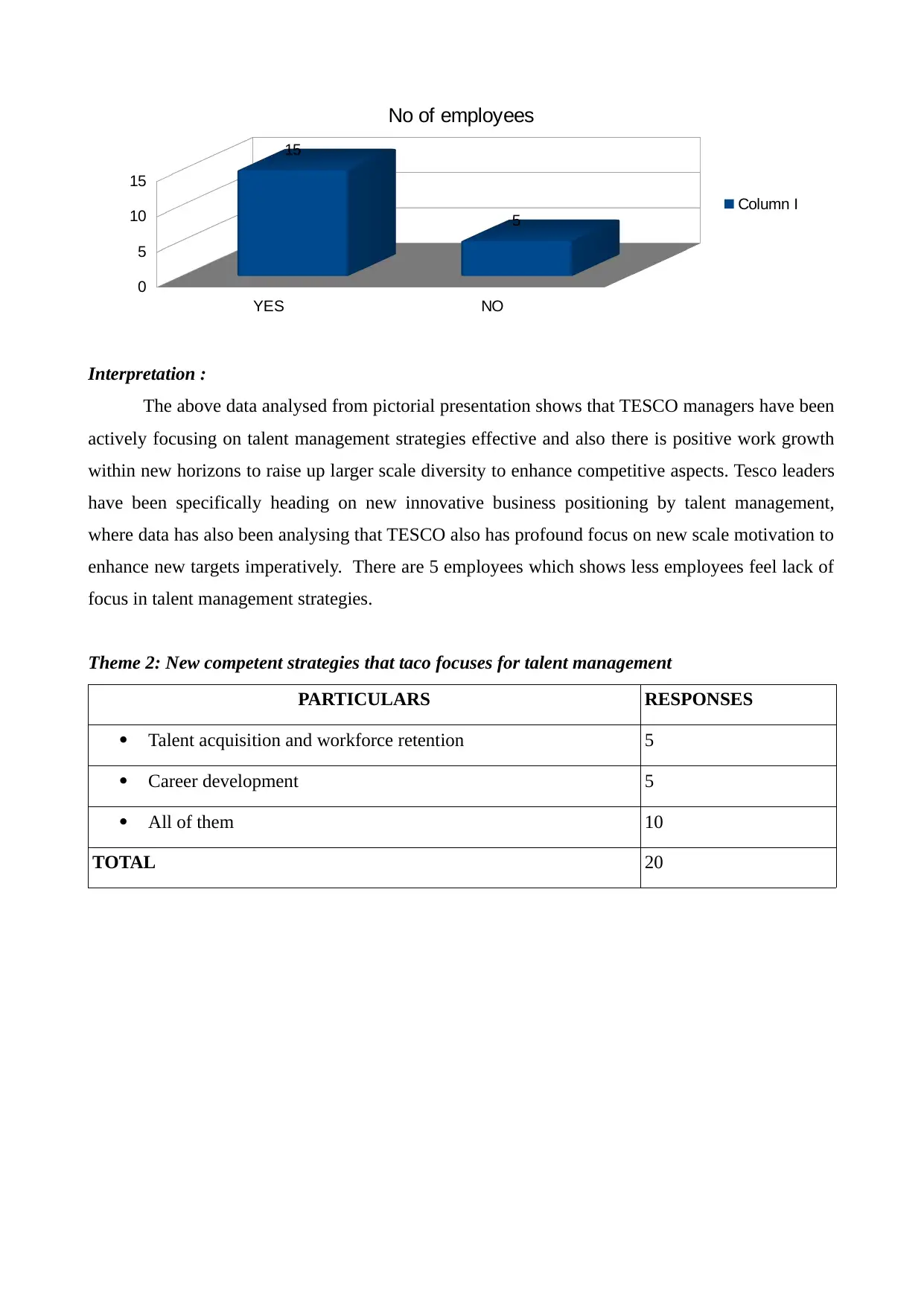
Interpretation :
The above data analysed from pictorial presentation shows that TESCO managers have been
actively focusing on talent management strategies effective and also there is positive work growth
within new horizons to raise up larger scale diversity to enhance competitive aspects. Tesco leaders
have been specifically heading on new innovative business positioning by talent management,
where data has also been analysing that TESCO also has profound focus on new scale motivation to
enhance new targets imperatively. There are 5 employees which shows less employees feel lack of
focus in talent management strategies.
Theme 2: New competent strategies that taco focuses for talent management
PARTICULARS RESPONSES
Talent acquisition and workforce retention 5
Career development 5
All of them 10
TOTAL 20
YES NO
0
5
10
15
15
5
No of employees
Column I
The above data analysed from pictorial presentation shows that TESCO managers have been
actively focusing on talent management strategies effective and also there is positive work growth
within new horizons to raise up larger scale diversity to enhance competitive aspects. Tesco leaders
have been specifically heading on new innovative business positioning by talent management,
where data has also been analysing that TESCO also has profound focus on new scale motivation to
enhance new targets imperatively. There are 5 employees which shows less employees feel lack of
focus in talent management strategies.
Theme 2: New competent strategies that taco focuses for talent management
PARTICULARS RESPONSES
Talent acquisition and workforce retention 5
Career development 5
All of them 10
TOTAL 20
YES NO
0
5
10
15
15
5
No of employees
Column I
⊘ This is a preview!⊘
Do you want full access?
Subscribe today to unlock all pages.

Trusted by 1+ million students worldwide
1 out of 23
Related Documents
Your All-in-One AI-Powered Toolkit for Academic Success.
+13062052269
info@desklib.com
Available 24*7 on WhatsApp / Email
![[object Object]](/_next/static/media/star-bottom.7253800d.svg)
Unlock your academic potential
Copyright © 2020–2026 A2Z Services. All Rights Reserved. Developed and managed by ZUCOL.





